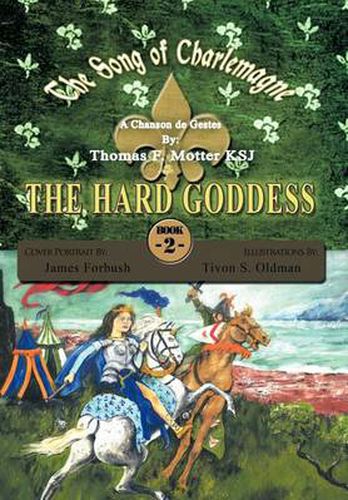Readings Newsletter
Become a Readings Member to make your shopping experience even easier.
Sign in or sign up for free!
You’re not far away from qualifying for FREE standard shipping within Australia
You’ve qualified for FREE standard shipping within Australia
The cart is loading…






This title is printed to order. This book may have been self-published. If so, we cannot guarantee the quality of the content. In the main most books will have gone through the editing process however some may not. We therefore suggest that you be aware of this before ordering this book. If in doubt check either the author or publisher’s details as we are unable to accept any returns unless they are faulty. Please contact us if you have any questions.
“Men march off to war because the women are watching.” So said Socrates. In “THE HARD GODDESS,” the second book of his trilogy-“The Song of Charlemagne,” the author introduces his reader to the women behind the men on the medieval battlefield. In so doing, one comes to understand and appreciate how French expressions such as “Feminine Mystique” and “Femme Fatale” must have originated and which are today, universally recognized and understood in the international lexicon without translation. Along the way, one also discovers a few of the ulterior motives underlying Charlemagne’s alliance with the Roman church as well as organized religion’s functional utility in the hands of potentates (be they Christian or Muslim) as a societal control mechanism. In the process of the troubadour’s telling of the story, the reader experiences visceral descriptions of Dark Age battle against the gloriously detailed backdrop of a France that is still there if one knows where to go and look. There is a reason Eleanor of Aquitaine is always credited with having “invented” the concepts of Romance, Chivalry and Courtly Love. She was far removed from the times in which he actually lived. Yet somehow, she must have sensed and understood Charlemagne’s hidden agenda regarding women within the church and the greater social order. But, in the final analysis, is anything within the pages of this work relevant with regard to contemporary world events and social issues confronting us all? Sadly, terribly.
$9.00 standard shipping within Australia
FREE standard shipping within Australia for orders over $100.00
Express & International shipping calculated at checkout
Stock availability can be subject to change without notice. We recommend calling the shop or contacting our online team to check availability of low stock items. Please see our Shopping Online page for more details.
This title is printed to order. This book may have been self-published. If so, we cannot guarantee the quality of the content. In the main most books will have gone through the editing process however some may not. We therefore suggest that you be aware of this before ordering this book. If in doubt check either the author or publisher’s details as we are unable to accept any returns unless they are faulty. Please contact us if you have any questions.
“Men march off to war because the women are watching.” So said Socrates. In “THE HARD GODDESS,” the second book of his trilogy-“The Song of Charlemagne,” the author introduces his reader to the women behind the men on the medieval battlefield. In so doing, one comes to understand and appreciate how French expressions such as “Feminine Mystique” and “Femme Fatale” must have originated and which are today, universally recognized and understood in the international lexicon without translation. Along the way, one also discovers a few of the ulterior motives underlying Charlemagne’s alliance with the Roman church as well as organized religion’s functional utility in the hands of potentates (be they Christian or Muslim) as a societal control mechanism. In the process of the troubadour’s telling of the story, the reader experiences visceral descriptions of Dark Age battle against the gloriously detailed backdrop of a France that is still there if one knows where to go and look. There is a reason Eleanor of Aquitaine is always credited with having “invented” the concepts of Romance, Chivalry and Courtly Love. She was far removed from the times in which he actually lived. Yet somehow, she must have sensed and understood Charlemagne’s hidden agenda regarding women within the church and the greater social order. But, in the final analysis, is anything within the pages of this work relevant with regard to contemporary world events and social issues confronting us all? Sadly, terribly.